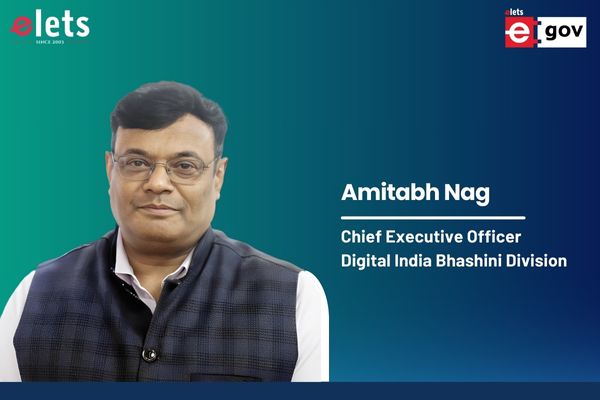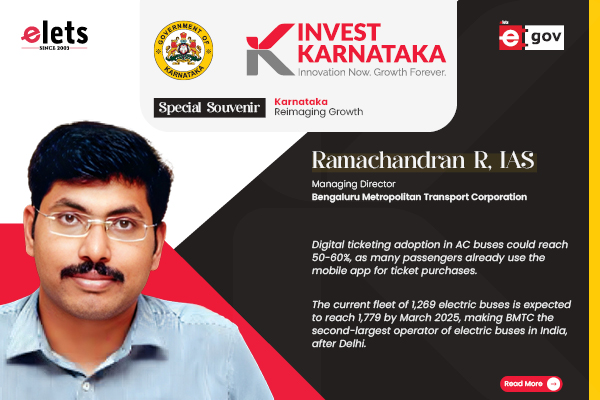
Uttar Pradesh’s Electric Vehicle Mobility Management (EVMM) Policy, launched in 2022, subsidises 400 electric vehicles with Rs. 20 Lakh each, up to five per institution. The policy aims to increase electric buses from 740 to 2,740 and establish 340 charging stations. Additionally, 500 electric autos will be introduced in seven cities by this June, shares Dr. Rajender Pensiya, IAS, Former Special Secretary, Urban Development Department & Director, Urban Transport, Government of Uttar Pradesh and CEO URIDA (Urban Road Infrastructure Development Agency) in an exclusive interaction with Ritika Srivastava of Elets News Network (ENN). Edited excerpts:
Could you provide an overview of the EV Policy and the government’s approach to its implementation?
Our Electric Vehicle Mobility Management (EVMM) Policy was launched in 2022. This policy includes a provision to subsidise 400 electric vehicles, with each vehicle eligible for a subsidy of Rs. 20 Lakh. Institutions can receive subsidies for up to five vehicles each. Also, the Directorate of Urban Transport is actively working to implement this policy at the local level.

What initiatives is the Uttar Pradesh government undertaking to promote EV adoption and advance the EV policy?

The Uttar Pradesh Government plans to increase the number of electric buses from 740 to 2,740 under the PM e-Bus Sewa initiative. Upon receiving approval from the Public Service Management (PSM), we will acquire 2,000 additional electric buses. Additionally, we aim to establish around 340 charging stations, with approximately 20 in each municipal council. Tenders have been issued for one station already, and rest tenders will be issued once the Election Commission’s code of conduct is lifted.

We are also introducing around 500 electric autos in seven cities, with Ayodhya already receiving its allocation. The remaining cities will receive theirs by the end of this June.
Moreover, we are exploring the potential for E-bikes, with a study by the World Resources Institute (WRI) to assess their feasibility in Uttar Pradesh.
What challenges does Uttar Pradesh face in adopting electric vehicles?
The primary challenge at a national level is the high cost of EV technology, making retrofitting unfeasible for many. To address this, the UP Government is focusing on raising public awareness about the benefits of EVs, including their environmental impact.
We are modifying the public transport system to support this shift, including introducing an E-pass facility with the NCMC Card and a monthly pass that allows unlimited bus travel. This is particularly beneficial for frequent commuters.
Additionally, we are encouraging public representatives and officers to use electric vehicles, leveraging their visibility to influence public behaviour. Our next awareness campaign will target schools, educating students on the environmental benefits of EVs and their potential to significantly reduce
pollution.
Are there any Public-Private Partnership (PPP) models and investments in Uttar Pradesh related to EVs?
Yes, the Uttar Pradesh government is actively developing EV infrastructure through PPP models. One notable initiative is the PM e-Bus service, which aims to introduce electric buses to 17 municipal councils. This project includes the construction of bus depots and the necessary power infrastructure to support these buses. Additionally, the government is establishing charging stations across the state. The Industry Department is leading the investment efforts to support these initiatives, ensuring that the infrastructure development aligns with the needs of the growing EV ecosystem.
Also Read | Challenges and Opportunities: The Future of Electric Vehicles in India
What is the vision for EVs in Uttar Pradesh over the next decade, and how will they become more accessible to the public?
The vision for EVs in Uttar Pradesh over the next decade involves a significant integration of electric buses into public transport. The state plans to add around 8,000 EV buses, with the PM e-Bus Sewa initiative contributing 2,000 buses to reach a total of 2,740. The strategy includes a phased plan to ensure Uttar Pradesh becomes highly connected with electric buses, gradually phasing out CNG and diesel buses. . By 2030, the goal is to have widespread adoption of EV buses throughout the state, with the first phase of this initiative set to commence next year. This approach will enhance public access to electric transportation, promoting a cleaner and more sustainable environment.
Be a part of Elets Collaborative Initiatives. Join Us for Upcoming Events and explore business opportunities. Like us on Facebook , connect with us on LinkedIn and follow us on Twitter, Instagram.
"Exciting news! Elets technomedia is now on WhatsApp Channels Subscribe today by clicking the link and stay updated with the latest insights!" Click here!













